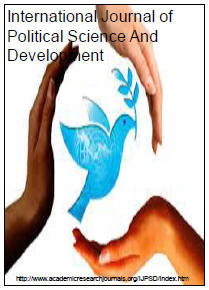| IJPSD |
International
Journal of Political Science and Development |
||||||||||||||||||||||
|
International Journal of Political Science and Development Vol. 3(7), pp. 301–325, July, 2015. DOI: 10.14662/IJPSD2015.039 ISSN: 2360-784X
Research Paper
Does Democracy Matter? A Study on Challenges for Peace in Nepal
Ganga Bahadur Thapa (Ph D)
Tribhuvan University Professor, currently President of Center for Democracy and Conflict Analysis, Kathmandu
Accepted 22 July 2015
Nepal has
travelled a long way in political and social terms through three waves
of democracy in 1951, 1990 and 2006; it had six constitutions in six
decades (1948 to 2007) and it is struggling to have a seventh now. The
latest turning point in its history was the Comprehensive Peace
Agreement in 2006 that ended the decade long Maoist conflict and
subsequent abolition of the Hindu monarchy by the elected Constituent
Assembly in 2008. Yet, it has failed to adequately promote and
strengthen the institutions of democracy and overcome the problems of
class, ethnicity, regional and gender discriminations, and economic
disparity largely due to weird manipulations of political mafia from
among limping proletarians of orthodox Marxism-Leninism-Maoism through
pompous democrats. This induces one to visualize vulnerability to two
kinds of threat: return of authoritarianism or roller-coaster form of
conflict in a corrupt state. Nepal’s current instability is also linked
to its geo-strategic position and omnidirectional foreign policy
incompatible to serve peace, stability, prosperity, and democracy. This
is an important inquiry for research. Cite This Article As: Thapa GB (2015). Does Democracy Matter? A Study on Challenges for Peace in Nepal. Inter. J. Polit. Sci. Develop. 3(7): 301-325
|
|
|||||||||||||||||||||
